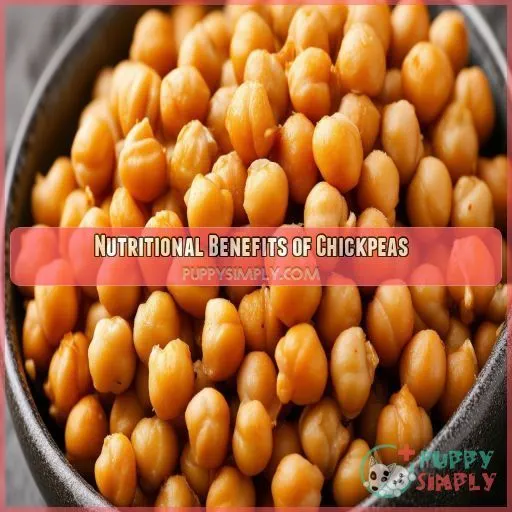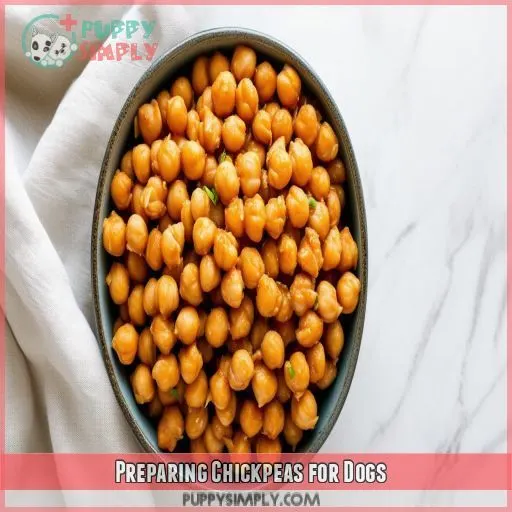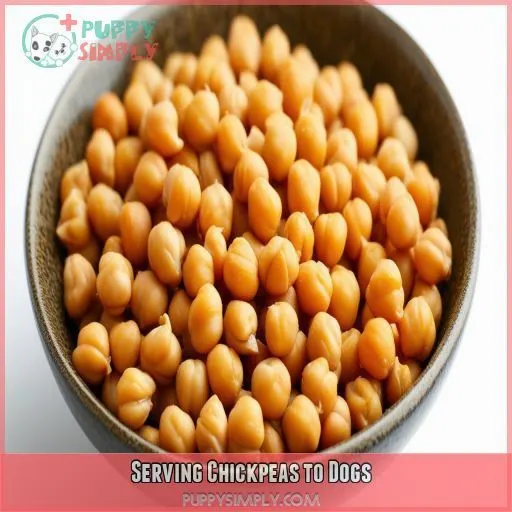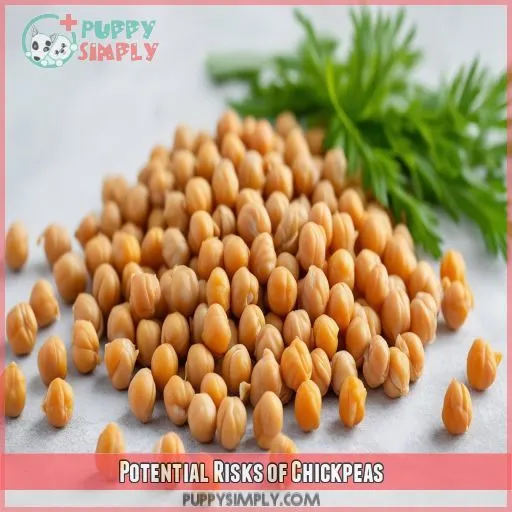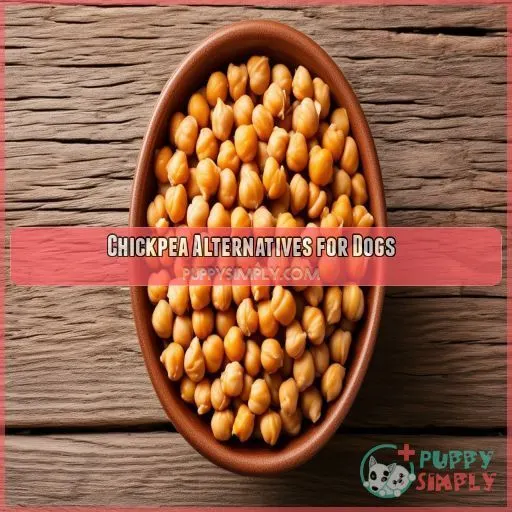This site is supported by our readers. We may earn a commission, at no cost to you, if you purchase through links.
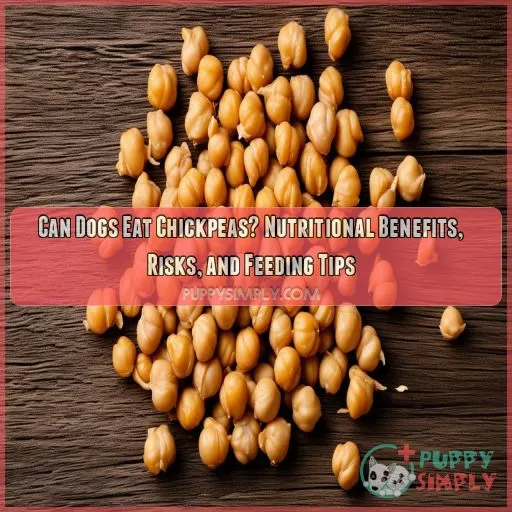
The answer’s a resounding yes, as long as they’re cooked simply without spices like onion or garlic.
Chickpeas are a great source of protein, magnesium, folate, and vitamins.
They’re often in natural dog foods, sneaking in extra nutrients for your furry friend.
Just steer clear of canned ones since they can be high in sodium, which isn’t good for dogs.
Think of chickpeas as little nuggets of health!
As with any treat, moderation is key.
Want to know how chickpeas can fit into a healthy dog diet?
Stick around for some handy tips!
Table Of Contents
- Key Takeaways
- Can Dogs Eat Chickpeas?
- Nutritional Benefits of Chickpeas
- Preparing Chickpeas for Dogs
- Serving Chickpeas to Dogs
- Potential Risks of Chickpeas
- Chickpea Alternatives for Dogs
- Is Hummus Safe for Dogs?
- Frequently Asked Questions (FAQs)
- Are canned chickpeas safe for dogs?
- Can dogs have lentils and chickpeas?
- Can dogs be allergic to chickpeas?
- Are canned chickpeas cooked?
- Can chickpeas affect dogs with allergies?
- Are there any specific dog breeds that shouldnt eat chickpeas?
- How do chickpeas impact a dogs dental health?
- Can older dogs benefit differently from chickpeas?
- How often can chickpea treats be given to puppies?
- Conclusion
Key Takeaways
- Chickpeas are a surprising treat for your furry friend, packed with plant-based protein and essential nutrients.
- Always cook chickpeas before serving them to your dog to avoid digestive issues and choking hazards.
- Introduce chickpeas gradually and watch for any allergic reactions, just like a cautious cat approaching a new toy.
- Serve chickpeas in moderation, like a wise chef balancing flavors, to prevent digestive upset and keep your dog’s tail wagging happily.
Can Dogs Eat Chickpeas?
Dogs can indeed eat chickpeas, also known as garbanzo beans, in moderation. These legumes are beneficial, promoting digestion, weight management, and boosting energy levels.
However, you should avoid feeding raw or dried chickpeas due to potential choking hazards and digestive issues. Always cook chickpeas thoroughly and rinse canned chickpeas to remove excess sodium. Avoid serving hummus, as it can contain toxic ingredients for dogs.
Nutritional Benefits of Chickpeas
Incorporating chickpeas into your dog’s diet provides a valuable source of plant-based protein, aiding muscle health and maintenance (Source). Additionally, their high fiber content supports digestive health, regularity, and ideal nutrition absorption .
Protein Source
Chickpeas are a fantastic plant-based protein source, essential for muscle growth, weight management, and overall satiety. They contain amino acids, necessary for maintaining protein levels and preventing protein deficiency in your dog’s diet. Incorporating chickpeas into their meals can enhance their protein intake, providing a balanced alternative to traditional animal proteins .
Fiber Content
Chickpeas are rich in fiber, which aids digestion, supports healthy bowel movements, and prevents loose stools . The fiber content in chickpeas helps manage your dog’s weight by prolonging satiety and controlling blood sugar levels . Additionally, fiber feeds beneficial gut bacteria, promoting overall digestive health .
Vitamin and Mineral Profile
Chickpeas are packed with essential vitamins and minerals like calcium, iron, and magnesium, which support your dog’s overall health. Their antioxidant properties and anti-inflammatory potential can boost immunity. Rich in plant-based protein, chickpeas aid muscle maintenance. Plus, they help regulate blood sugar and benefit gut bacteria .
Preparing Chickpeas for Dogs
When preparing chickpeas for your dog, cook them thoroughly and avoid raw or dried chickpeas, which can be hard to digest and pose choking hazards. If using canned chickpeas, rinse them to remove excess sodium, ensuring they’re plain without any added salt or preservatives.
Cooking Methods
To prepare chickpeas for dog treats, opt for boiling, roasting, or dehydrating techniques. Boiling guidelines recommend soaking chickpeas overnight, then cooking for 60-90 minutes for ideal digestibility . For roasting options, thoroughly cook chickpeas, ensuring they’re plain, with no additives or salt . Avoid raw chickpeas, ensuring safety .
Canned Vs. Dried
When preparing chickpeas for dog food, both canned and dried options require proper preparation. Canned chickpeas are convenient but check for sodium and additives, rinsing thoroughly before use. Dried chickpeas need soaking and boiling until soft. Both methods guarantee your dog gets a nutritious, additive-free treat that supports healthy anal glands and digestion .
Removing Excess Sodium
Removing excess sodium from canned chickpeas is essential for your dog’s health. Here’s how to do it:
- Rinse them thoroughly: Use a colander and cold water.
- Soak them: Let them sit in fresh water for 2-3 hours.
- Change water midway: Refresh the water halfway through soaking.
- Cook them: Boil in unsalted water for 10 minutes .
Serving Chickpeas to Dogs
When serving chickpeas to dogs, it’s imperative to follow recommended portion sizes and frequency to prevent overfeeding and digestive issues. Mixing chickpeas with other foods such as lean proteins or vegetables can enhance their nutritional value while ensuring a balanced diet for your pet (Source).
Portion Sizes
When determining portion sizes for serving chickpeas to dogs, follow these guidelines: Extra-small dogs should consume 1 tablespoon, small dogs 2 tablespoons, medium dogs 3 tablespoons, large dogs 4 tablespoons, and extra-large dogs 5 tablespoons, 2-3 times a week. This helps prevent digestive issues and choking risks .
Frequency
When feeding chickpeas to your dog, maintain moderation for good health. Adhere to the following frequency guidelines:
- Extra-small to small dogs: 2-3 times per week.
- Medium to large dogs: 2-3 times per week.
- Extra-large dogs: 2-3 times per week.
This prevents digestive issues, obesity, and minimizes allergy risks .
Mixing With Other Foods
Mixing chickpeas with other dog foods can enhance their diet. Chickpeas boost energy, support muscle health, and aid in weight loss. An ideal mix for dog health and nutrition is outlined below:
| Dog Size | Chickpea Portion | Mixing Tip |
|---|---|---|
| Extra-small | 1 tbsp, 2-3 times/week | Mix with lean meat or pureed vegetables |
| Small | 2 tbsp, 2-3 times/week | Combine with rice or plain yogurt |
| Medium | 3 tbsp, 2-3 times/week | Blend with chopped fruits like apples or bananas |
| Large | 4 tbsp, 2-3 times/week | Add to cooked oatmeal or green bean mash |
| Extra-large | 5 tbsp, 2-3 times/week | Integrate into meals with carrots or cucumbers |
Potential Risks of Chickpeas
You need to be aware of the potential risks when feeding chickpeas to dogs, such as digestive issues, allergic reactions, and choking hazards. Excessive consumption can lead to stomach upset, flatulence, and diarrhea, so always monitor your dog’s response to new foods .
Digestive Issues
Feeding your dog chickpeas can lead to digestive issues including flatulence, diarrhea, and bloating. To avoid these problems, follow these steps:
- Cook chickpeas thoroughly to aid digestion and prevent anal gland issues .
- Limit intake to promote healthy gut bacteria .
- Avoid high sodium varieties .
Allergic Reactions
Allergic reactions to chickpeas can occur in dogs, presenting symptoms such as itching, swelling, digestive upset, and respiratory issues . To prevent allergies, introduce chickpeas gradually and conduct allergy testing if you notice any symptoms. For allergy treatments, consider antihistamines, and consult your vet for proper medication .
Choking Hazards
Feeding raw chickpeas to dogs poses a choking hazard, especially for small dogs, senior dogs, and even large breeds. Always cook or mash chickpeas to prevent blockages. Make sure the chickpeas are soft, removing any hard bits. This helps make the treat safe and minimizes the risk of choking incidents for your furry friend.
Chickpea Alternatives for Dogs
When considering chickpea alternatives for dogs, other legumes, lean proteins, and various fruits and vegetables are excellent choices. These options offer diverse nutritional benefits and can complement your dog’s diet effectively .
Other Legumes
When considering chickpea alternatives for dogs, think about other legumes that offer similar benefits without the risk of chickpea allergies or bloating. Suitable options include:
- Lentils: Great source of protein and fiber.
- Peas: High in vitamins and minerals.
- Black beans: Packed with antioxidants, aiding overall health.
Select legumes thoughtfully to prevent overfeeding .
Lean Proteins
Lean meats like chicken, turkey, and beef are excellent chickpea substitutes for dogs. These lean proteins support muscle maintenance without extra calories. Make sure the meat is cooked thoroughly and unseasoned to prevent any toxicity. Including these options in your dog’s diet can provide similar benefits without the risks of chickpea allergies and toxicity .
Fruits and Vegetables
Switching to fruits and vegetables can provide essential nutrients while avoiding chickpea storage and allergy concerns. Consider these healthy options:
- Carrots: Great for digestion and low in calories.
- Green beans: Packed with fiber and vitamins.
- Blueberries: Antioxidant-rich treats.
- Cucumbers: Hydrating and crunchy.
- Broccoli: Nutritious and easy to prepare.
Is Hummus Safe for Dogs?
When considering hummus for your dog, homemade options without harmful additives are preferable. Store-bought versions often contain toxic ingredients like garlic and lemon juice, which can pose serious health risks to dogs .
Homemade Vs. Store-Bought
When considering hummus for your dog, homemade versions are preferable over store-bought. Store-bought hummus often contains harmful ingredients like garlic and lemon juice, which pose health risks to dogs.
Making hummus at home allows you to control what goes into it, ensuring it’s safe and nutritious. Opt for using cooked, plain chickpeas—either dried and cooked or canned with low sodium—mashed into a smooth paste.
Remember to avoid adding unnecessary additives to keep the treat safe and healthy for your furry friend.
Ingredients to Avoid
When you’re feeding chickpeas to your dog, it’s vital to avoid certain ingredients that can be harmful.
Hummus, particularly store-bought, often contains garlic (thiosulfate) and lemon juice (citric acid), both of which are toxic to dogs .
Opt for plain, cooked chickpeas without any additives. Additionally, be cautious of chickpea substitutes like dried versions; these can be a choking hazard and cause digestive upset.
Always rinse canned chickpeas to remove excess sodium and allergens .
Frequently Asked Questions (FAQs)
Are canned chickpeas safe for dogs?
Canned chickpeas are safe for dogs if they’re canned in water, rinsed thoroughly, and free from high sodium or preservatives. Always avoid raw chickpeas and check for additives to guarantee your dog’s health and safety .
Can dogs have lentils and chickpeas?
Yes, dogs can have lentils and chickpeas. Both are nutritious, providing protein, fiber, and essential vitamins. Make sure they’re cooked and served in moderation to avoid digestive issues and never feed raw or hummus to dogs .
Can dogs be allergic to chickpeas?
Yes, dogs can be allergic to chickpeas. Symptoms of an allergy may include itching, swelling, gastrointestinal issues, or respiratory difficulties . Always introduce chickpeas gradually and monitor for adverse reactions .
Are canned chickpeas cooked?
Yes, canned chickpeas are cooked, making them convenient for immediate use. However, you should rinse them thoroughly to remove excess sodium and preservatives, ensuring they’re safe for both humans and dogs .
Can chickpeas affect dogs with allergies?
Yes, chickpeas can cause allergies in dogs, leading to symptoms like itching, swelling, and gastrointestinal issues. Always monitor your dog for any adverse reactions after introducing chickpeas into their diet .
Are there any specific dog breeds that shouldnt eat chickpeas?
If your dog has a known legume allergy, chickpeas are likely a no-go. For instance, Bulldogs, who are prone to food sensitivities, may experience gastrointestinal issues eating chickpeas .
How do chickpeas impact a dogs dental health?
Including chickpeas in a dog’s diet offers nutritional benefits but doesn’t directly impact dental health. Chickpeas provide fiber and protein, but focusing on chews or specific dental treats is essential for improving and maintaining oral hygiene .
Can older dogs benefit differently from chickpeas?
Older dogs benefit from chickpeas due to high fiber aiding digestion, protein supporting muscle maintenance, and anti-inflammatory properties relieving arthritis symptoms. They also provide essential vitamins and minerals, boosting overall health and well-being .
How often can chickpea treats be given to puppies?
Think of chickpea treats as golden autumn leaves scattered lightly. You can offer puppies chickpea treats 2-3 times per week. Make certain you give them in moderation to avoid digestive issues, such as bloating or diarrhea .
Conclusion
Paradoxically, while chickpeas aren’t the first treat you’d think of for dogs, they’re surprisingly beneficial. By incorporating them properly, you can boost your dog’s health with plant-based protein and essential nutrients.
Just make certain chickpeas are cooked, avoid raw or dried types, and rinse canned varieties. Serve in moderation to prevent digestive issues.
With these tips, you’ll confidently answer, “can dogs eat chickpeas,” knowing you’re making a healthy choice for your furry friend.

